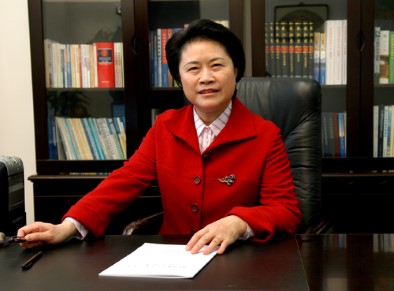Karma with Water
Qihua has engaged in water since 1977 when she started to learn knowledge on irrigation and drainage engineering in Hefei University of Technology. After graduation, her professional career was initiated in Anhui Provincial Survey and Design Institute of Water Resources and Hydropower. From the Institute to the Water Resources Department of Anhui Province, her role shifted from an engineer to a decision-maker. Standing out from all competitors, she was appointed as the Deputy Director General of the Water Resources Department of Anhui Province in 1995. Later in 1998, she was promoted to be Director General of Water Resources Department of Anhui Province the only female director general in China at that time. In 2001, she was appointed as the Commissioner of the Changjiang (Yangtze River) Water Resources Commission and also the first female toppest leader in the commission’s history. Before her retirement in 2015, she completed political life in water sector by the Ministry of Water Resources as vice minister since 2012 responsible for issues on policies, laws and regulations, South-to-North Water Diversion Project, etc.
Challenge #1: Fighting Against Flood and Drought Disasters
As being asked what she would say are the main challenges in her work as a woman, she recalled a moment during the period of the Yangtze River flood in 1998 when the then Premier Wen Jiabao said to her: “Qihua, all water leaders always have a sense walking on eggshells. And the flood was even Achilles' heel to ancient water officials who were killed and the whole clan was implicated by disastrous flood incidents.” It led her to be on the alert for the flood control and management. The first challenge in her work is to minimize loss due to flood and drought and to protect people. All details, from rainfall information to on scene command, tolerate zero error that might drive people in deep distress. The flood of Yangtze River in 1996 put a dyke in danger. She spent two weeks working at site for removing risks. An additional most impressive experience was about the Yangtze River flood in 1998. It was the largest disastrous flood to the Yangtze River on the record since 1954. For the disaster, she spent over 90 days and nights at her office to work out measures controlling aggressively increasing water level at dykes of the Yangtze River and protecting Anhui Province that was already on red alert. The Anhui Provincial Government appreciated the overnights workout of her team for providing accurate information and solution on the way to the decisive victory of the flood control. In 2008, the Wenchuan earthquake caused dramatic landslides and catastrophic draining of lakes behind landslide-dams, the worst of which was Tangjiashan Barrier Lake. There was a high possibility of submerging downstream and upstream basins of the Yangtze River. Qihua organized a technical support team from the Changjiang (Yangzi River) Water Resources Committee heading for the disaster zone. The roadways were collapsed in the earthquake, and thus, the rescue plane could not land on the barrier lake area. Qihua and her team had to jump 2 meters to barrier from the rescue plane. The team stationed around the barrier lake working out plans to remove threats of Barrier Lake upon their whopping on-site surveys and data collections. Their work released the flood peak and secured local residents as well. Besides water related disasters, the water administration and river development and protection appear to be another challenge.

Qihua on the spot of Tangjiashan Barrier Lake
Challenge #2: River Security
To Qihua, the vital is a secure river and livelihood, which echoes in her tenure of office in the Changjiang (Yangtze River) Water Resources Commission. She has put forward her theory of the healthy Yangtze River, stressing that the development of the Yangtze River must embrace protective measures and protection of the river should leave space to development as well that has been essential to development and management of the Yangtze River. The theory is interpreted farther in her book The Healthy Yangtze River and The Entrustment of the Yangtze River. The books explicate the concept of healthy Yangtze River, measures of maintaining river health and strategies of river development, making reference to the professionals of river development and protection and all walks of life who have concern on river.
Challenge #3: Public Concern on Water and River
For raising the public awareness of protecting and valuing the Yangtze River, she has been open to the social opinions. Being the Commissioner, she answered the questions regarding controversial issues of the Three Gorges Project. The article “Ten Questions to the Three Gorges Project” she wrote responded concerns about the possible earthquake resulted from the project and its link to drought disasters and also throughout the defined motive of planning the project, its flood control capacity and impact on ecosystem and environment of the Yangtze River. She was interviewed by the CCTV (the highest level TV media in China) in this regard.
Pursuance
Qihua pursues a ceaseless river that meets contemporary development demand and benefits next generations. Completing her political duty in the Ministry of Water Resources, she will engage in GWP China farther working on water resources management and development.
Water leaders always confront challenges and more challenging to female managers. Qihua holds the balance between office and family, easily shifting her role from a water leader to a wife and mother. Even under heavy workload, she is capable of taking care of family and doing sports towards a confident and healthy life.
